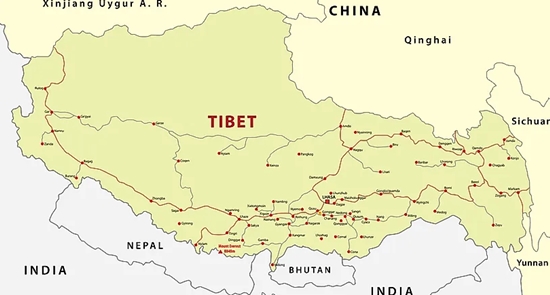
As part of its cartographic assault on lands that it has conquered and lands that it wants to conquer, China has been changing the name of one of the conquered lands, Tibet, to “Xizang” on all maps and documents. It has also urged the rest of the world to follow suit.
The rest of the world does not always cooperate, but catalogue makers at two French museums were recently willing to do so. Various parties objected, however, including Tibetans (“Activists Denounce Paris Museum After Report Finds Tibetan Exhibits Were Renamed,” ARTNews, September 24, 2024).
On Saturday [September 21], Tibetan activists convened outside the Musée Guimet in Paris to protest the museum’s decision to replace exhibition materials that identify certain artifacts as Tibetan by replacing it with the Chinese name for the region….
Activists accused the museums of being complicit in Chinese political pressure to undermine Tibetan culture by altering and generalizing cataloguing terms that display Tibetan roots as distinct from Chinese regions. Organizers are calling for the terms “Tibet” to be returned to exhibition spaces at both museums.
But now the museums are either changing their minds or merely correcting alleged clerical errors.
Bitter Winter’s Massimo Introvigne reports that after having been “named and shamed for their abject subservience to Xi Jinping, Musée Guimet and Musée du quai Branly are trying to save their reputation” (“Renaming Tibet ‘Xizang’: Are French Museums Backing Off?,” September 24, 2024).
On September 1, 2024, Le Monde published an op-ed signed by…French academic Tibetologists and experts of Asian art accusing the Musée Guimet and the Musée du quai Branly of having sold their soul to Xi Jinping. The Musée du quai Branly had changed the name “Tibet” to “Xizang,” according to Beijing’s diktat, in its catalogues. The Guimet had changed the title of its “Tibetan” rooms to “Himalayan World” rooms.
The scholars reminded the readers of Le Monde that calling Tibet “Xizang” is a historical fraud….
[The scholars also wrote that for French museums to submit to] “the rewriting of history is a sign of great weakness. Our scientific and cultural institutions must, as a matter of the utmost urgency, reject any interference by undemocratic foreign regimes.”
Normally, faced with the power and money of China, these appeals have no consequences. However, the criticism directed at two prestigious (and beautiful) museums was echoed by media all over the world….
Finally, the Musée du quai Branly stated that it “uses the appellation Tibet in its cartels [labels] of the permanent collections and has never ceased to use this appellation in its work on the collections.” “Xizang” replaced “Tibet” on the Internet, but this was due to a “technical update in progress that may be misleading.” The Musée Guimet claims that, on the contrary, it keeps using “Tibet” on the Internet, and “Himalayan” means that the same rooms are now devoted to both Tibet and Nepal.
We wait for the results of “technical updates in progress”—and what will happen when the international media looks the other way….
Introvigne has his doubts about whether the museums’ stumbling and less than candid reversal will stick because it is often as easy to reverse a reversal of a morally bad decision as it was to make the decision to begin with. Especially if such decisions are determined less by any desire to consistently adhere to sound principle than by pressures of the moment. China knows how to exert pressure.





